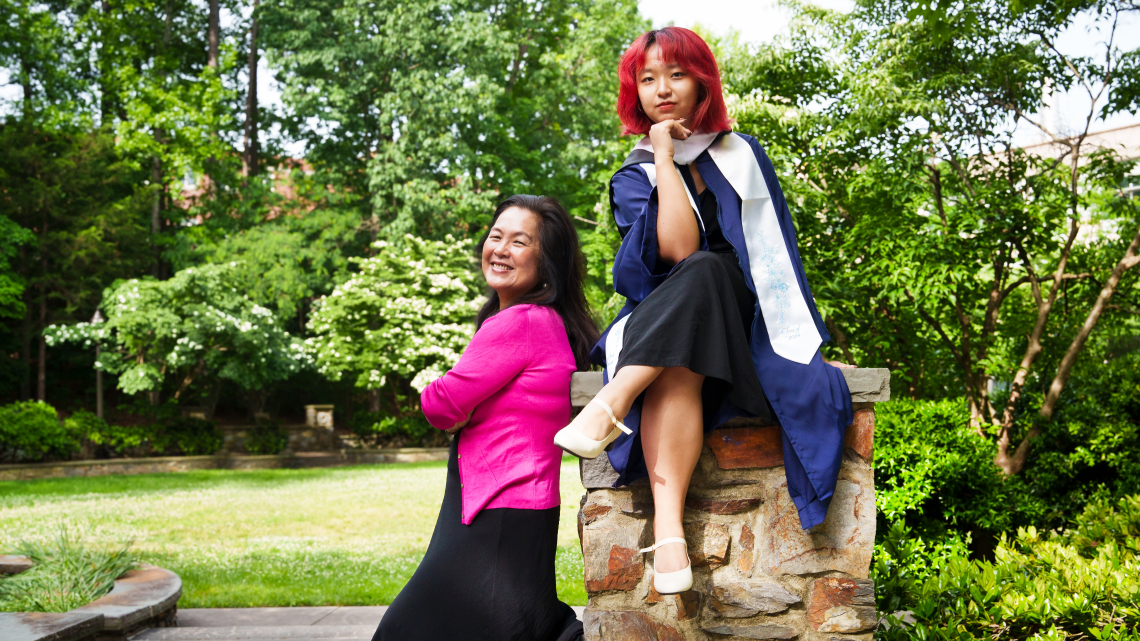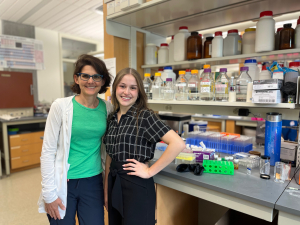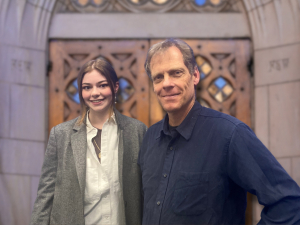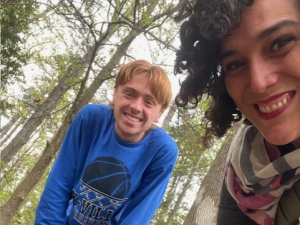
Living in the Both
Asian American & Diaspora Studies professor Eileen Chow and student Huiyin Zhou (T’24) discuss the fruits of inter-generational collaboration, the power of collective poetry writing and the different kinds of intimacies that emerge from being able to comfortably switch between languages.
Related links:
How Strangers Can Build Community Together
HuiyinZhou.com
COAcollective.com
Story Lab at Duke
Full Transcript
Welcome to Duets, a podcast exploring the human side of research collaborations between Duke faculty and undergraduate students.
Today we're joined by a faculty member Eileen Chow and student Huiyin Zhou, whose collaborative research in Asian American and Asian Diaspora Studies and Chinese language translation is grounded in multidisciplinary humanities work.
Eileen: I'm Eileen Chow. [Salutation in Mandarin.] I'm a Professor in Asian and Middle Eastern Studies, Asian American Diaspora Studies. My research interests concern all manners of narrative, including film, fiction, poetry, popular culture fandoms, anime, Chinatowns. You name it.
Huiyin: I’m Huiyin. [Salutation in Mandarin.] I’m a Cultural Anthropology major, Asian American Diaspora Studies minor and Documentary Studies Certificate. I'm interested in transnational Chinese queer feminist arts organizing, community building and how different pathways to activism lead us to different futures and liberation.
Eileen: So, how do we first meet?
Huiyin: I feel like we probably first met on social media.
Eileen: I remember first encountering you because you sent me an email to get into my graduate seminar, and I was really surprised because you were a sophomore. And I remember thinking that you had really interesting things to say about why you want to be in the class. So, I encouraged you to circle back. And you did — and you ended up being the one undergrad in that graduate seminar.
Huiyin: Now that you mention it, I remember you replied, like — if you have a project that will include a translation section, you will recommend me taking the class. And, eventually, I did. So, it’s really, it feels like a full circle moment.
Eileen: Right. So, I hope I planted a seed.
Huiyin: Yes.
Eileen: Because your eventual thesis, which has won both your department prize and parts of it have been published, and you're still working on developing it into multiple kinds of projects. And I'm really happy that it showcased a lot of the language work that you did in the translation seminar.
So, Huiyin, your research is so much about collaboration and I just wanted to pick your brain about how collaboration is important?
Huiyin: Collaboration is really where a lot of the creativity and the critical thinking comes through. Because what we're doing is bridging spaces of activism and art and having different perspectives together. A lot of what I rely on is a community archive. We have this big Google drive with a lot of documents, photos, videos from our community-engaged social practice, art projects, performances and workshops. Having this collaborative archival practice has been just so generative in thinking about how my research can serve our community and potentially adapting it to more public-facing articles that would raise awareness of the very important work that young Chinese queer feminists do, both in the U.S. and in China.
I'm really interested in how collaboration is also important for your work.
Eileen: So, teaching, for me, I do think of it as collaboration. Certainly, in my own academic journey as a humanities person, I was very attracted to the content of the scholarship, but I think part of me always found it very lonely. And when my kid was little — he was six or seven — and Durham's great, little independent bookstore used to invite the local school kids for the annual poetry workshop, and my kid was a little freaked out. So, we sat down, and we traded ideas and I helped him shape the poem that he wanted to write. And after we finished, he said to me: Mommy, I really like writing with you. And I almost burst into tears. And when you started showing me your collaborative poetry writing, I'm remember thinking — now, why didn't we always work this way? I'm constantly learning through collaboration with different generations of students, how it is possible to think outside the box of what I thought my field was.
Huiyin: So, I'm curious, what was a time that your research or maybe your research process has made you feel hopeful?
Eileen: When I first started teaching, I met most of my future students as fellow volunteers in Boston Chinatown. And one said to me: we do this volunteer work, but I really wish I learned something about the history and the context of Chinatown. And I thought, you're absolutely right. I'll teach a course about it. Years later, when I would teach this course at Duke, I realized the undergrads I encounter are brilliant, amazing young people, but most of them had no urban experience. And so, a lot of the issues that we discussed seemed really alien in terms of crowdedness, gentrification, etc. And I started writing a multiplayer Chinatown game precisely so that I would give students a way to embody and to experience some of the issues within a Chinatown. One of my students who was playing an activist, she was compromising with the Walmart faction, and she had never really thought of why a local resident within a space would be very suspicious of big business. But then I said, let's look at the case of L.A. Chinatown — Walmart came in, bought the block and then left two years later, and therefore, basically, destroyed that block and all the businesses that were on it. And when she studied that, the next session she showed up for the game, she had her mouth taped shut with duct tape and she held a sign the whole time because she suddenly had a recognition that — oh, so when you are voiceless, you're only possible avenues aren't waiting your turn or trying to negotiate with people who don't want to negotiate with you and maybe protest, even within that game space, was one of the avenues that she could explore. Those are the moments when teaching and research come together for me. When people embody ideas and biographies radically different from themselves, they're able to see something that maybe doing things quote-unquote “in a traditional way” would not.
Huiyin: For me, a lot of it comes down to the community connections that we’re able to make, and what are ways of organizing that can be attentive to different access levels, different disability needs, and also just creating different ways of engaging with community that are maybe not explicitly registered as political but are very much part of the movement. There's a lot of collective poetry writing workshops that I organized, co-organized with my Collective members. And there was a lot of anxiety in terms of so many protests happening in China. We're away, but our family is there, and there's a lot of questions of like — does anything we do here even matter? And when we can't physically be there, how can we stand in solidarity with people that we deeply care about, we feel a sense of closeness with, but then we can't even pinpoint where that closeness comes from, or where that closeness would lead us to. And grappling with a lot of those questions was why we wanted to offer a space of collective poetry writing, processing a lot of these complicated feelings together. And going back to the poems and what people have shared in this space, I began to realize that there is the kind of imaginative intimacies that we're actively building. A lot of my research is ethnographical and it's based on the community archive, but in one interview, the conversation that flows and the trust that they gave me, they shared with me their experience about the movement in China and in diasporic Chinese communities, and how they were feeling in that. In that collective poetry writing workshop, they were actually able to feel safe. That felt very grounding during a time when I was kind of frustrated with the whole process of writing. It was just rejuvenating for me and made me realize — oh, yes, I'm writing this for my community and it is important that their voices are heard and that our experiences are theorized from the ground. And so that gave me back the hope to continue through the research process, and really made me believe in the value of having these activists and scholarly collaboration. And that's something that I hope to carry forward.
Eileen: Huiyin, you and I usually code-switch. Like, we rarely speak to each other only in English. How do you think this conversation would be if we were speaking in Chinese?
Huiyin: I definitely feel a lot more personal connection when we're talking in Chinese.
Eileen: Right.
Huiyin: Because I feel like there's more humor that I could put into that language because it's my native language. And sometimes when I speak with you, like, in English, it's more like we are speaking in that professor-student context, because it's the language of conducting classes. But that's not to say that I cannot create a sense of closeness with someone in English. I think that there are things that, like, both languages enable, but also inhibit.
Eileen: It is just a way of life. It is a way of life that we comfortably live between languages. And as you point out — yes, I think English structure is a kind of scholarly discourse among us. But then when we speak Chinese together, maybe there are other kinds of intimacies that are possible. And when we switch back and forth, that's also a third kind of intimacy, right? To be able to share the ease within multiple languages is something I enjoy a great deal. I feel like I live in the both, and that's nice. And I like that we both share in that both-ness.
Most folks know the best way to find me is on socials and I'm Chowleen, C H O W L E E N on most platforms and NarrativeJunkie, one word on Instagram.
Huiyin: To find out more about my work, you can visit my website at HuiyinZhou.com. To follow up on my collective’s work our name is the Chinese Artists and Organizers Collective and the acronym is CAO. You can follow us on Instagram at CAO Collective, or find us on our website at caocollective.com.
Senior Editor and Producer: Cara August, Trinity Communications
Audio Editor and Mixer: Marc Maximov
Music Composition: Grace Davis, T’26
Production Sponsor: Trinity College of Arts & Sciences, Duke University
Recording Date and Location: April 2024, Bryan Center Studios
Duets is produced by Trinity College of Arts and Sciences at Duke University.



